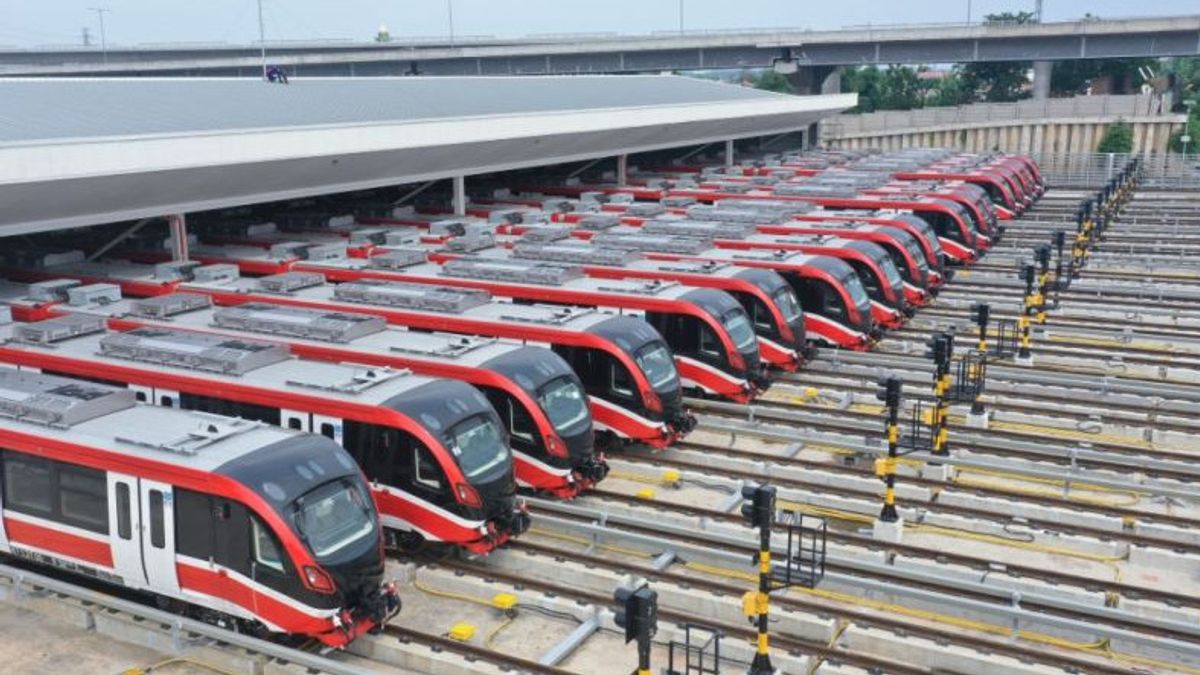JAKARTA - PT Kereta Api Indonesia or KAI (Persero) has prepared the completeness of the Jabodebek LRT Depot in Bekasi for the purpose of storing, inspecting, maintaining, and repairing LRT facilities and their supporting components.
"As the most modern mode of transportation that will operate in Indonesia, the Jabodebek LRT certainly requires the support of qualified maintenance facilities," said VP of Public Relations of KAI Joni Martinus Joni in a statement in Jakarta, quoted from Antara, Wednesday, August 10.
The Jabodebek LRT depot is located in East Bekasi District, Bekasi Regency, with an area of about 100,000 square meters. The Depo area that is ready to be used is the Underfloor, Stabling, Automatic Train Wash Plant (ATWP) and Operation Control Center (OCC) building. As for the Light Maintenance and Heavy Maintenance areas, they are currently still under construction with a progress of 85.11 percent.
Previously, he said, the Jabodebek LRT facilities were placed on the Jabodebek LRT lines.
Now that the stabling area at the Jabodebek LRT Depot can be occupied, the Jabodebek LRT facility has occupied the stabling area or storage area for the Jabodebek LRT facility. There are 20 lanes in the stabling area to protect Jabodebek LRT facilities from hot weather, rain, and other external disturbances.
The Light Maintenance area has 10 lines and is used for inspections and light maintenance such as daily inspections and maintenance as well as monthly maintenance with cycles of 1, 3, 6, and 12 months.
While the Heavy Maintenance area has 4 lines used for major maintenance with an annual cycle.
The Jabodebek LRT Depot also has a test track area of one lane which is used as a place to test the Jabodebek LRT facilities after maintenance or repairs are carried out.
"With the test track, the Jabodebek LRT line will only be used for operations," he said.
Furthermore, the superior facility of the Jabodebek LRT Depot is that there is an ATWP of 1 lane which is used as a place for washing the Jabodebek LRT facilities automatically.
The method of washing using the ATWP is that the Jabodebek LRT train drives on the ATWP line for initial wetting and sprays soap on the front, rear, and side windshields and then brushes. Then do the initial rinsing, brushing the roof, and ending with the final rinsing.
After finishing the washing process, the Jabodebek LRT train comes out of the ATWP in a clean state. Washing with this system takes much faster time than manual washing with good results.
According to him, this automatic washing is very effective and efficient because it has a wastewater treatment system (Water Treatment System) where the washing water is processed so as not to pollute the environment.
Through this system, the water used after washing will be accommodated and treated by separating the water from sand, oil, and grease so that the water does not pollute the surrounding environment.
"KAI is very concerned about environmental factors for the Jabodebek LRT washing process. Even for the final rinse, KAI uses demineralizing water or pure water without mineral or chemical substances so it doesn't pollute the environment," said Joni.
Furthermore, Joni said, another very vital area at the Jabodebek LRT Depot is the OCC area which functions as the main administration and control center.
The Jabodebek LRT will operate according to the schedule that has been uploaded to the signaling system at OCC. In addition, in the OCC area, a train simulator will be installed to train the skills of the train attendant in driving the LRT.
Later, there will also be maintenance facilities for the Jabodebek LRT train such as wheel lathes, train power supplies, rail shunters that can be used for slashing movements, mobile lifting jacks to lift train sets, and others.
All Jabodebek LRT operations then run automatically by following a predetermined schedule. Operators at OCC will monitor the running of the LRT and will only intervene if discrepancies are found such as delays, power supply interruptions, and so on.
He added that currently the progress of the Jabodebek LRT as a whole has reached 84.22 percent.
Various aspects have been prepared through various stages of testing to ensure operational reliability and customer safety in the future.
"KAI has prepared the Jabodebek LRT mode as best as possible with a variety of modern and quality equipment. So that in the long term, Jabodebek LRT transportation remains reliable," concluded Joni.
The English, Chinese, Japanese, Arabic, and French versions are automatically generated by the AI. So there may still be inaccuracies in translating, please always see Indonesian as our main language. (system supported by DigitalSiber.id)













